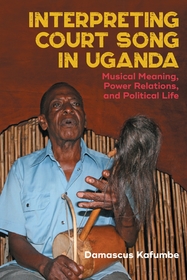
Interpreting Court Song in Uganda
Musical Meaning, Power Relations, and Political Life
Series: Eastman/Rochester Studies Ethnomusicology; 16;
- Publisher's listprice GBP 85.00
-
40 608 Ft (38 675 Ft + 5% VAT)
The price is estimated because at the time of ordering we do not know what conversion rates will apply to HUF / product currency when the book arrives. In case HUF is weaker, the price increases slightly, in case HUF is stronger, the price goes lower slightly.
- Discount 20% (cc. 8 122 Ft off)
- Discounted price 32 487 Ft (30 940 Ft + 5% VAT)
Subcribe now and take benefit of a favourable price.
Subscribe
40 608 Ft

Availability
Estimated delivery time: In stock at the publisher, but not at Prospero's office. Delivery time approx. 3-5 weeks.
Not in stock at Prospero.
Why don't you give exact delivery time?
Delivery time is estimated on our previous experiences. We give estimations only, because we order from outside Hungary, and the delivery time mainly depends on how quickly the publisher supplies the book. Faster or slower deliveries both happen, but we do our best to supply as quickly as possible.
Product details:
- Publisher Boydell & Brewer Ltd
- Date of Publication 5 August 2025
- Number of Volumes Print PDF
- ISBN 9781648251221
- Binding Hardback
- No. of pages348 pages
- Size 228.6x152.4 mm
- Weight 666 g
- Language English 684
Categories
Short description:
A critical interpretation of essential Kiganda royal court songs that examines how the meanings of their lyrics enter into dynamic dialogue with contemporary national politics in Uganda.
MoreLong description:
A critical interpretation of essential Kiganda royal court songs that examines how the meanings of their lyrics enter into dynamic dialogue with contemporary national politics in Uganda. Lyric interpretation, which Damascus Kafumbe defines as a process of creative renewal that infuses vitality into songs, enables interpreters and analysts to derive a multiplicity of meanings from songs instead of being limited to a single literal narrative. As he and his research collaborators demonstrate, the process extends the life of a song by allowing it to generate new versions, meanings, and relevance. Kafumbe examines how lyric interpretation serves to renew the lives of twenty-one songs from the repertoires of royal court musicians of the Kingdom of Buganda, arguing that the meanings of these songs are not singular, static, and monolithic but rather dynamic and multivalent. Through extensive research within past and present contexts, Kafumbe presents a series of unique perspectives on the ways Kiganda court songs reflect varied kinds of power relations. These meanings, which surface via lyric interpretation, come from daily interactions among citizens and between leaders and subjects. This interpretive process helps illuminate truths and clarify myths about the power dynamics that shape political life in present-day Uganda, highlighting the relevance of court song lyrics to contemporary national contexts. By engaging with the book's wide range of voices, readers will learn to appreciate these songs, their historical and contemporary contexts, and their composer-performers' stories and interpretations more fully. This book is available as Open Access under the Creative Commons license CC BY-NC-ND.
MoreTable of Contents:
"Prologue: Songs, Stories, and Strategies Part I: Foundations 1. Political Landscape, Court Music, and Research Collaborators 2. Research Methods and Approaches to Lyrical Interpretation 3. A Multi-Epistemological Framework: Theoretical Discourses and Canons Part II: Songs about Political Engagement, Criticism, and Commentary 4. ""The Handsome Catch a Slight Squint"": False Praise 5. ""Fair-Skinned"": Flattery, Deceit, and Satire 6. ""As He Plucked Them"": Greed and Selfishness 7. ""Householder"": Mourning and Ridicule 8. ""Federalism"": Manipulation, Exploitation, and Reciprocity Part III: Songs about Leadership and Responsibility 9. ""Unadvisable Kayemba"": Advice and Caution 10. ""He Has a Lot on His Mind"": Deliberation and Animosity 11. ""Gganga Had a Narrow Escape"" or ""They Chopped Off His Fingers"": Punishment and Mercy Part IV: Songs about Loyalty and Duty 12. ""I Would Have Given You a Large Haplochromis"": Regret and Appreciation 13. ""The Flutists' Legal Case"": Lament and Uncertainty 14. ""The Little Lion"": Power and Selfishness 15. ""The King Is a Lion"": Reverence and Love Part V: Songs about Mutuality and Cooperation 16. ""Mawanda Loves His Men"" and ""They Show Each Other Stumps"": Love, Unity, and Reciprocity 17. ""Baamunaanika Hill"": Genuine Praise 18. ""We Love the Supreme Man Exceedingly"": Love and Respect Part VI: Songs about Conflict and Loss 19. ""Ssematimba and Kikwabanga"": War and Fate 20. ""Poland"": War and Imperialism 21. ""The Battle of Nsinsi"": Civil War 22. ""Let Me Plod with a Stick Close to Kibuuka"": Disagreement and Invocation 23. ""The Pebble is Breaking Me"": Mortality and Spirituality Author Interviews Works Cited Index"
More




